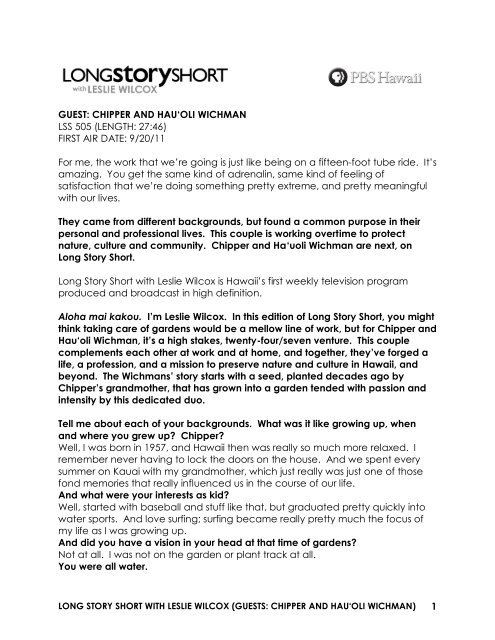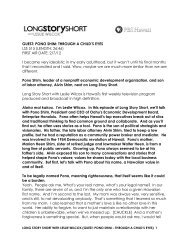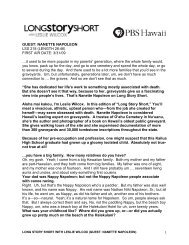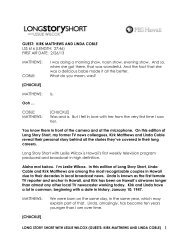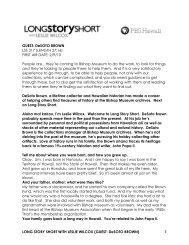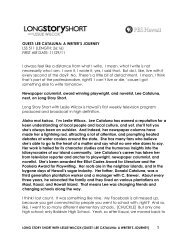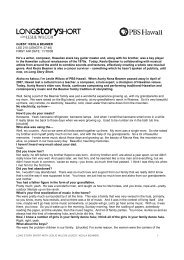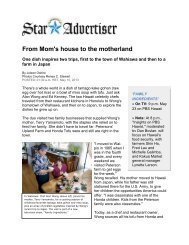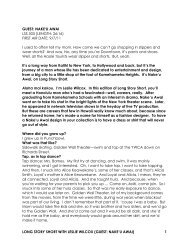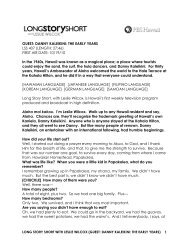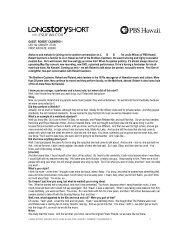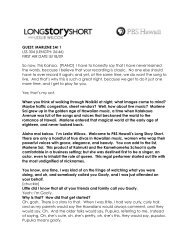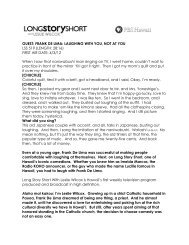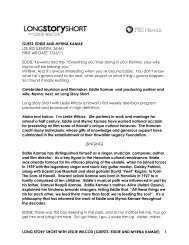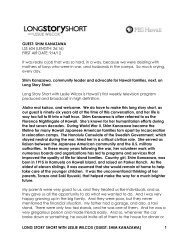1 GUEST: CHIPPER AND HAU'OLI WICHMAN LSS ... - PBS Hawaii
1 GUEST: CHIPPER AND HAU'OLI WICHMAN LSS ... - PBS Hawaii
1 GUEST: CHIPPER AND HAU'OLI WICHMAN LSS ... - PBS Hawaii
You also want an ePaper? Increase the reach of your titles
YUMPU automatically turns print PDFs into web optimized ePapers that Google loves.
<strong>GUEST</strong>: <strong>CHIPPER</strong> <strong>AND</strong> HAU‘OLI <strong>WICHMAN</strong><br />
<strong>LSS</strong> 505 (LENGTH: 27:46)<br />
FIRST AIR DATE: 9/20/11<br />
For me, the work that we’re going is just like being on a fifteen-foot tube ride. It’s<br />
amazing. You get the same kind of adrenalin, same kind of feeling of<br />
satisfaction that we’re doing something pretty extreme, and pretty meaningful<br />
with our lives.<br />
They came from different backgrounds, but found a common purpose in their<br />
personal and professional lives. This couple is working overtime to protect<br />
nature, culture and community. Chipper and Ha‘uoli Wichman are next, on<br />
Long Story Short.<br />
Long Story Short with Leslie Wilcox is <strong>Hawaii</strong>’s first weekly television program<br />
produced and broadcast in high definition.<br />
Aloha mai kakou. I’m Leslie Wilcox. In this edition of Long Story Short, you might<br />
think taking care of gardens would be a mellow line of work, but for Chipper and<br />
Hau‘oli Wichman, it’s a high stakes, twenty-four/seven venture. This couple<br />
complements each other at work and at home, and together, they’ve forged a<br />
life, a profession, and a mission to preserve nature and culture in <strong>Hawaii</strong>, and<br />
beyond. The Wichmans’ story starts with a seed, planted decades ago by<br />
Chipper’s grandmother, that has grown into a garden tended with passion and<br />
intensity by this dedicated duo.<br />
Tell me about each of your backgrounds. What was it like growing up, when<br />
and where you grew up? Chipper?<br />
Well, I was born in 1957, and <strong>Hawaii</strong> then was really so much more relaxed. I<br />
remember never having to lock the doors on the house. And we spent every<br />
summer on Kauai with my grandmother, which just really was just one of those<br />
fond memories that really influenced us in the course of our life.<br />
And what were your interests as kid?<br />
Well, started with baseball and stuff like that, but graduated pretty quickly into<br />
water sports. And love surfing; surfing became really pretty much the focus of<br />
my life as I was growing up.<br />
And did you have a vision in your head at that time of gardens?<br />
Not at all. I was not on the garden or plant track at all.<br />
You were all water.<br />
LONG STORY SHORT WITH LESLIE WILCOX (<strong>GUEST</strong>S: <strong>CHIPPER</strong> <strong>AND</strong> HAU‘OLI <strong>WICHMAN</strong>) 1
It was like surf, surf, surf, and when the surf wasn’t good, we’d go diving, and<br />
really just enjoyed growing up around the ocean and being part of that.<br />
Now, your parents sent you to some very private pricey schools; Hanahauoli,<br />
Punahou.<br />
Yeah.<br />
And your dad was an attorney.<br />
M-hm.<br />
But you didn’t continue in the private school mode; you went to a public school,<br />
Roosevelt for your high school years.<br />
Yeah. I guess you could say maybe I was a challenging teenager, and didn’t<br />
probably really appreciate the opportunities they were giving me in terms of<br />
education when I was growing up. So, we had a little parting of the ways, and I<br />
really enjoyed going to Roosevelt. And for me, what it did also is, Roosevelt with<br />
Papakolea right there, is it really connected me with our <strong>Hawaii</strong>an community.<br />
That was a real benefit for me. And certainly, I think, to a large degree,<br />
Punahou recognizes that, and celebrates the fact that, you know, we’re here in<br />
<strong>Hawaii</strong> and the <strong>Hawaii</strong>an culture. But you get to a place like Roosevelt, where<br />
it’s not pretend, it’s for real.<br />
[CHUCKLE]<br />
And back in the day, there was still Kill Haole Day. And so, you know what I<br />
mean?<br />
How did you fit into that scenario?<br />
Hey, I made friends with the biggest mokes right away, man.<br />
[CHUCKLE]<br />
That was—that was my buddies.<br />
And that worked. [CHUCKLE]<br />
Yeah. Sure, was good, because in the end, people really see right through your<br />
exterior and see who you are on the inside, what kind of a person you really are<br />
and what your values are. And I think that was what made me successful at<br />
Roosevelt.<br />
Do you have regrets about not being more into school at the time?<br />
Very much so. And I didn’t really truly appreciate that until after I had worked<br />
for several years at the garden, and had an opportunity to go back to school.<br />
And when I did, I went to UH Manoa, got in through the community college<br />
system. And what I found was really amazing. I saw a lot of kids that were<br />
eighteen-year-olds, and they were there because Mom and Dad said, You<br />
gotta go to school, you gotta to the University after you graduate. And they<br />
didn’t have a strong interest, they weren’t driven. I was there, totally like a<br />
sponge, and for me, it was awesome. Whereas, I practically almost flunked out<br />
of high school, I graduated from UH Manoa with a 4.0.<br />
And you went up to get a master’s.<br />
Phi beta kappa.<br />
Yeah.<br />
LONG STORY SHORT WITH LESLIE WILCOX (<strong>GUEST</strong>S: <strong>CHIPPER</strong> <strong>AND</strong> HAU‘OLI <strong>WICHMAN</strong>) 2
I mean, so it’s more than the grades and everything. It was a learning<br />
opportunity, and I continue to benefit from that for my entire life. So it’s really—I<br />
regret not having taken advantage of those opportunities my parents provided<br />
for me, but on the other hand, everything in my life has been there for a reason.<br />
I don’t regret the fact that I got to really connect with our <strong>Hawaii</strong>an community<br />
at that early age.<br />
The School of Papakolea is a good school.<br />
Absolutely.<br />
[CHUCKLE]<br />
Still get plenty friends from there.<br />
So, Chipper, it seems like you were born from a privileged kamaaina family.<br />
M-hm.<br />
Grew up in Honolulu.<br />
M-hm.<br />
Mostly. And, you’re from a Nanakuli family of modest means. You’re the first<br />
person in the family to go to college.<br />
That’s correct.<br />
And Hau‘oli, tell me about your background in Nanakuli.<br />
Yes. So I grew up in Nanakuli, born and raised there. Born in ’58, so Farrington<br />
Highway was two lanes. And my grandparents—we lived in my grandparents’<br />
home. And later, we moved next door, ‘cause my aunt lived next door, then<br />
she moved to Maunawili. So, we were always with Grandma, and family was<br />
always around. The aunties and uncles that lived in the neighborhood,<br />
everyone was our cousins, and we played and went to the beach, and just<br />
enjoyed life out there in the country.<br />
And went to public schools in the area?<br />
Yes. Nanaikapono Elementary, then Nanakuli Intermediate.<br />
Tell me about your dad. ‘Cause you have this great story about him digging<br />
holes.<br />
Well, he graduated from Waipahu High School, and got a job at <strong>Hawaii</strong>an<br />
Electric. And his first—well, one of this first jobs, he was a laborer, and he had to<br />
dig the holes for the electric poles. He became a foreman, and eventually<br />
retired from Maui Electric, where he was the superintendent of construction<br />
there.<br />
That’s right; you moved to Maui for your—is it high school or college years?<br />
High school; high school. Yeah; I was fourteen, and then we moved our whole<br />
family of—I’m the oldest of five, and we moved, and my dad started working<br />
there in the early 70s, first as a foreman, and then, superintendent when he<br />
retired.<br />
What was it like moving from Nanakuli to—what part of Maui?<br />
Right in Kahului. Well, it was a big change for me. And I was kind of wondering,<br />
Should I stay in Nanakuli and live with my grandparents? But no, we just all<br />
moved together to Maui. And the school I attended was Maui High. So it was a<br />
feeder school, and all country folks from upcountry and Paia and Haiku all<br />
LONG STORY SHORT WITH LESLIE WILCOX (<strong>GUEST</strong>S: <strong>CHIPPER</strong> <strong>AND</strong> HAU‘OLI <strong>WICHMAN</strong>) 3
came to this one school. So, it was really easy. It wasn’t like I was coming in as<br />
a stranger. Everyone came together at the school.<br />
Everybody had to meet at the school.<br />
Exactly; yeah.<br />
Though they didn’t know each other at the time, Chipper Wichman also went<br />
from Oahu to a neighbor island at about the same age, but for very different<br />
reasons. As Chipper recalls, his parents had reached the end of the rope with<br />
their fifteen-year-old son.<br />
They were a little worried about you for a while back there.<br />
They were very worried.<br />
[CHUCKLE]<br />
They were very worried. And you never appreciate that until you become a<br />
parent.<br />
Oh, how did they act when you were kind of acting up at Punahou?<br />
Well, they may have a different recollection of it, but I think I’d really driven them<br />
to their wits’ end. And fortunately, my grandmother was willing to take me in, so<br />
I actually went to live on Kauai with my grandmother during that very, I’d say,<br />
pretty stressful period of time for them.<br />
Which turned out to be formative in your life, because she would eventually<br />
encourage you to get an internship in horticulture.<br />
That’s right; that’s right. I mean, she was a woman of great vision, and really<br />
ahead of her time, and she was such a champion of the <strong>Hawaii</strong>an culture, as<br />
well as plants. She was working to preserve native plants when she was growing<br />
up. She was born in 1901. So I mean, people hadn’t even truly appreciated our<br />
native flora and understood its threats back then. So really, an amazing woman<br />
who provided for me those seeds of conservation and research, and culture<br />
that have grown into, really, the values that have driven me in my life.<br />
And you two met at UH Manoa, right?<br />
That’s correct.<br />
Tell us about the meeting.<br />
[CHUCKLE] Actually, our first class we had together was ethnobotany, which<br />
was very appropriate, considering our lives are so involved with plants. And our<br />
teacher at that time, Dr. Isabella Abbott, who recently passed away, is really an<br />
icon in the plant world. And so being able to have her—she was in her prime<br />
back then, thirty years ago. And so, I was really looking forward to that class.<br />
Did sparks fly in ethnobotany?<br />
Not really. We saw each other, but we barely talked. But we do recognize that<br />
was where we first saw each other.<br />
It was a big, huge auditorium classroom, so there was a lot of people there.<br />
When did you meet in earnest?<br />
LONG STORY SHORT WITH LESLIE WILCOX (<strong>GUEST</strong>S: <strong>CHIPPER</strong> <strong>AND</strong> HAU‘OLI <strong>WICHMAN</strong>) 4
Actually, in <strong>Hawaii</strong>an Language class, couple of semesters later. And Hau‘oli’s<br />
grandmother on her father’s side was Mama Hale. And Mama Hale was one of<br />
the manaleo, or really the kupuna who helped bring the language back after<br />
the Constitutional Convention. And she was somebody I had actually got to<br />
know very, very well, and didn’t even realize it was Hau‘oli’s tutu lady. So, later,<br />
we—actually, our first date was to go to her grandma’s birthday party.<br />
Grandparents played pivotal roles in the lives of Hau‘oli and Chipper Wichman.<br />
Between high school and college, Chipper’s grandmother, Juliet Rice Wichman,<br />
urged him to apply for an internship with the National Tropical Botanical Garden.<br />
Little did he know that he would make his career there, working his way from<br />
intern to CEO. Since 2003, Chipper has run the Garden Organization, a family of<br />
tropical gardens and preserves across <strong>Hawaii</strong>, and also in Florida.<br />
It really is an amazing organization, chartered by the United States Congress as<br />
a nonprofit. And that’s really confusing to people, how did that even come to<br />
be. The vision was, our founders wanted to see this organization funded<br />
privately, with private money, and not being just another federal agency. But<br />
having that Congressional charter really set the bar high. It was clear that this<br />
organization had a destiny that needed to be fulfilled in terms of making a<br />
global difference. And that means today for us, working on not only a regional<br />
scale here and helping to really fulfill immediate needs here in <strong>Hawaii</strong> in terms of<br />
stopping the extinction of plants and helping to preserve our culture, and<br />
meeting educational needs. We really have a three-pronged focus; education,<br />
scientific research, and conservation. And we fulfill all of those on both local,<br />
national, and international scales.<br />
How about telling me a couple of things that people may not know about the<br />
garden.<br />
We are a nationally chartered organization, chartered by the United States<br />
Congress. But that idea, that thought came out of the Honolulu Garden Club<br />
by very visionary women, including Loy McCandless Marks, who was the<br />
president. I was recently given a packet of the minutes of the Garden Club<br />
meetings from like 1954 or 1955, when they talked about creating this<br />
organization. And it’s amazing to see how it went from a Garden Club meeting<br />
all the way to succeeding in convincing the United States Congress that this was<br />
indeed an action worthy of a public law. We have the world’s largest collection<br />
of endangered species, federally listed endangered species. It’s really an<br />
amazing collection of plants, but it’s not what the visitor is typically looking for,<br />
like the beautiful Bird of Paradise that are right behind you, or Heleconia. We<br />
have amazing plants, but they aren’t collected or arranged or displayed for<br />
their beauty.<br />
Are they homely little plants? Is that what you’re saying?<br />
LONG STORY SHORT WITH LESLIE WILCOX (<strong>GUEST</strong>S: <strong>CHIPPER</strong> <strong>AND</strong> HAU‘OLI <strong>WICHMAN</strong>) 5
Many of ‘em are, but some are majestic trees. But they’re not what the<br />
average visitor expects when they come to see a botanical garden. Our<br />
gardens have really been developed by scientists and conservationists as these<br />
living laboratories. It’s time for us to make them public venues, so that the public<br />
can come and really get a better understanding some of these global issues<br />
and what we’re dealing with, and there is no better way to convey that than in<br />
the beauty of a botanical garden.<br />
In 1987, three years after Chipper and Hau‘oli Wichman were married, their<br />
family and professional lives once again collided. Chipper’s grandmother<br />
passed away, and left him the thousand-acres Limahuli Valley on Kauai. It was<br />
not exactly a gift, but a duty to carry out her vision of protecting the valley’s<br />
natural and cultural resources.<br />
This was a kuleana, that this was a responsibility to preserve it in perpetuity, but<br />
more than just preserve it. This was an area that was crying out for active<br />
management, and it took us seven years, but we succeeded in getting the<br />
State to create a special subzone called the Limahuli Valley Special Subzone,<br />
and approve a very active comprehensive management plan, a master plan<br />
for it. And today, it’s considered really one of the poster childs in the State in<br />
terms of biocultural conservation, celebrating the importance of the area as a<br />
cultural area to native <strong>Hawaii</strong>ans, and restoring the cultural values, practices, as<br />
well as plants<br />
After your grandmother, Juliet Rice Wichman, gave you the kuleana, you in turn<br />
gave it.<br />
That’s right. We gifted that property in 1994 to the garden, after we had put in<br />
place the special subzone, after we knew that indeed the garden could<br />
properly manage it. And when we gave that property away, our kids were<br />
pretty young. So our son was born in ’85, this was ’94, he was nine and our<br />
daughter was seven. So here we were, we gave away the only piece of<br />
property we ever owned. And they looked at us like, Mom and Dad, are you<br />
nuts or what? And in fact, I think they thought we were pretty nuts anyways,<br />
raising them out in Haena at the end of the road, with no TV, or radio.<br />
And in those days, it seemed more remote.<br />
It was much more remote. And, it was not nearly as crowded as it is today, and<br />
the traffic was less. It was really, really wonderful. But what impressed them<br />
were the values that they grew up with. And later, as they got older, and<br />
especially after they went to Kamehameha School and University of <strong>Hawaii</strong>,<br />
they look back on that with so much pride, and they are so proud to bring their<br />
friends and show them their home, and where they grew up. And they’re very<br />
proud of what we accomplished with that property and the gift of it. It was an<br />
important experience for us in terms of learning how to fulfill a kuleana, what it<br />
really means to malama aina, and to care for the land. Because far too often,<br />
we think of aina as a commodity to be bought and sold, and that its highest<br />
LONG STORY SHORT WITH LESLIE WILCOX (<strong>GUEST</strong>S: <strong>CHIPPER</strong> <strong>AND</strong> HAU‘OLI <strong>WICHMAN</strong>) 6
and best use is the economic return you can get from it, when indeed, the aina<br />
has so much more to offer us.<br />
Hau‘oli, at what point did you get passionate about Chipper’s dream, the<br />
garden? And because you do it a hundred ten percent, so you can’t be<br />
lukewarm about it.<br />
Well, it was after our children were grown up, and we started managing the<br />
Kahanu Garden in Hana. And then, I realized it was serious work, and there was<br />
a lot to do, and there was a bigger kuleana out there.<br />
And you had family out there, so you saw community connections building.<br />
Oh, definitely. And that was very important for us to come into a small<br />
community, <strong>Hawaii</strong>an community, but having family made it so much easier for<br />
us to get to know the other people there, and accomplish what we needed to<br />
do in taking care of Kahanu Garden and the Piilanihale Heiau.<br />
So, you’ve got to give us some relationship tips, because you were together<br />
constantly, and you have such a good relationship. How does that happen? Or<br />
are you good at pretending?<br />
No, I don’t think you can pretend for twenty-eight years. [CHUCKLE]<br />
He’s the boss. [CHUCKLE]<br />
Well, I think relationships, it’s hard work. And I hope that, if nothing else, we can<br />
convey that to our kids, is we really, really understand and believe that the<br />
future of our island, of our communities are dependent on strong families. And<br />
maintaining a marriage is never easy. It’s give and take, and it’s being able to<br />
really hear and understand the other person. I think she’ll tell you I do all the<br />
talking than listen. It’s hard sometimes when you have a dominant personality<br />
to slow down and be a good listener. So that’s something that I really try and<br />
practice. She said I’m the boss, but I think she’s got some very, very valuable<br />
ideas, and feelings, and when I really stop and listen to them, she’s almost<br />
always right.<br />
What do you do when you can tell he’s not listening?<br />
Sometimes, she jokes around; I gotta send you an email, even though I’m sitting<br />
three feet away, to get your attention. Because our life is so busy, I think that<br />
can be frustrating. Communication is so important, and being able have<br />
common activities that you enjoy doing together. I think many couples end up<br />
going different ways because they don’t have enough common enjoyment<br />
together. So, one takes off in this direction, and the other one takes off in that<br />
direction, and before long, your lives are kind of heading in very different<br />
directions. For us, we’re probably the extreme example of the other mix.<br />
How much time on a typical day do you spend together?<br />
[CHUCKLE] Twenty-four hours. [CHUCKLE]<br />
All the time?<br />
Yeah.<br />
LONG STORY SHORT WITH LESLIE WILCOX (<strong>GUEST</strong>S: <strong>CHIPPER</strong> <strong>AND</strong> HAU‘OLI <strong>WICHMAN</strong>) 7
Pretty much.<br />
How do you do that?<br />
Well, you know, it’s not for every couple, but the requirement of the work that<br />
we’re involved in, in leading a major nonprofit organization, as I’m sure you well<br />
know, you live it yourself, is pretty consuming. And for us, it’s given us a chance<br />
to be able to do it together, and be together. Hau‘oli said something many<br />
years ago. She goes, It’s a good thing we do this together, otherwise, we’d<br />
never see each other. And especially now, with the extensive itinerary and<br />
travel schedule we have to do, being involved with a national board and<br />
international programs, that’s really true. And I feel very blessed that she’s really<br />
embraced it, and enthusiastically made it a part of her life. And I can honestly<br />
say, I would not be sitting here having this interview, if it wasn’t for her and all the<br />
support that she’s done. It also means there isn’t a whole lot of separation<br />
between work and home, because we go home, and we’re eating dinner and<br />
we’re talking about work. But you know what? That’s our life.<br />
You have to both be passionate about it, or it doesn’t work, right?<br />
Exactly. Yeah.<br />
What do you contribute, Hau‘oli, and how does your working partnership go? I<br />
mean, usually, it boils down to who’s better at what, right?<br />
Well, I just kind of, I guess, keep him organized, and pick up all the loose ends,<br />
and try to just do the housekeeping. And he’s just going forward, and just lot of<br />
meetings, lot of telephone conferences, and so I’m just in the background,<br />
mostly.<br />
And you’ve heard him described as the man with the big vision.<br />
M-hm, m-hm.<br />
And that’s true, isn’t it, Chipper? You think big. You’re not making small plans.<br />
That’s right. Yeah. When they asked me to become the CEO of this national<br />
organization, I knew, in fact we talked extensively about it. We knew that it<br />
would be a major change in lifestyle. We’d have to move from our family home<br />
where we raised our children, and it would mean extensive traveling and really<br />
giving up almost everything we were previously doing, in order to take this on.<br />
But it also meant that it gave us an opportunity to really make a difference on a<br />
global scale. It’s been an amazing journey for us, and I think Hau‘oli is<br />
excessively modest. She does not like the limelight, and when we have all these<br />
international meetings, she isn’t up there at the podium giving presentations.<br />
But, she provides for me some of the most valuable input, because when<br />
everybody’s gone, we talk a lot about what’s going on, and she’s really a great<br />
strategic thinker and a great identifier of people and their personalities, and<br />
what motivates them. And so, we have a lot of really important conversations<br />
behind the scenes, that people are never really aware of.<br />
You’ve got another sharp pair of eyes—<br />
Exactly.<br />
—with another perspective.<br />
LONG STORY SHORT WITH LESLIE WILCOX (<strong>GUEST</strong>S: <strong>CHIPPER</strong> <strong>AND</strong> HAU‘OLI <strong>WICHMAN</strong>) 8
Exactly.<br />
And Hau‘oli, your kids are actually going in the footsteps of landscape, and land<br />
management, right?<br />
Pretty much; yeah. Mikioi studies ethnobotany, and she’s taking a little time off<br />
right now traveling. But, she’ll go into a master’s, either botanical garden<br />
management or education. And our son is studying landscape architect right<br />
now.<br />
What’s your goal with the gardens? Where do you go next? What’s your vision<br />
for the future?<br />
Great question. We’re right now in the process of developing a new five-year<br />
strategic plan, which takes the garden really to the next level, in terms of both<br />
developing the funding base as well as really tying us in with more international<br />
programs, and making a global impact. At some point in the course of the next<br />
five years, we also need to begin thinking about planning for the future in terms<br />
of transitions and leadership. While I’m not looking at retiring any time soon, I<br />
think it is really important to think about transitioning the organization at some<br />
point to new leadership, and assuring its sustainability. And that’s never easy to<br />
do for somebody who makes that their life every day.<br />
But you’ve gotta do it, because you want the organization to go on.<br />
Absolutely. Yeah. We need to understand our role in the global picture and<br />
how those factors outside of <strong>Hawaii</strong> affect what we’re doing, and as well as the<br />
fact that what we’re doing here can be a leadership model to help others<br />
around the world. And I think <strong>Hawaii</strong> has a lot to offer. We were at a meeting a<br />
couple weeks ago that was convened by the United Nations on the global<br />
strategy for plant conservation. Several of us from <strong>Hawaii</strong> went and gave<br />
presentations. And <strong>Hawaii</strong> is a microcosm of the world. We’re dealing with all<br />
of those issues, whether it’s endangered species, invasive plants,<br />
overdevelopment, lack of water. We’re dealing with it here, and yet, we’re<br />
dealing with it on a small enough scale that we can develop models that can<br />
then be scaled up and applied to larger areas. And I think being able to put<br />
<strong>Hawaii</strong> on the world stage will help us. It will leverage our work in <strong>Hawaii</strong> in a<br />
tremendous way, as well as, I believe, contribute significantly to making the<br />
world a better place, and helping other countries with their strategies.<br />
Do you ever resent the gardens for the toll they take on you and your personal<br />
relationship?<br />
I don’t think so. I mean, it’s just a wonderful place to work. It’s a very healing<br />
place to be in. Of course, some things are very intense, but to me, the garden is<br />
a very healthy and healing place for us.<br />
And having common goals is huge.<br />
Exactly; yeah.<br />
We really do try and protect our weekends, because those are having time for<br />
yourself, and even if it’s just working in the yard, or working in the taro patch, or<br />
walking in the garden, or walking on the beach, it is important.<br />
LONG STORY SHORT WITH LESLIE WILCOX (<strong>GUEST</strong>S: <strong>CHIPPER</strong> <strong>AND</strong> HAU‘OLI <strong>WICHMAN</strong>) 9
Chipper and Hauoli Wichman pursue their conservation and research efforts<br />
across the State, the Continent, and around the world. They lead a frequent flyer<br />
lifestyle. A big part of their mission at the National Tropical Botanical Garden is<br />
to educate the public, and share their tropical treasures. So, if you get the<br />
chance, they’d welcome your visit to the award-winning gardens on Kauai and<br />
Maui, as well as in Florida. For Long Story Short, and <strong>PBS</strong> <strong>Hawaii</strong>, I’m Leslie<br />
Wilcox. A hui hou kakou.<br />
For audio and written transcripts of this program, and all episodes of Long Story<br />
Short with Leslie Wilcox, visit pbshawaii.org.<br />
I accepted the directorship of that garden on three conditions when our<br />
chairman of the board called me up and asked me to take it on. I said, Under<br />
three conditions; one is, I’m the captain of the ship. We’re gonna have to make<br />
some hard decisions, and you’re gonna support it; don’t question it. Number<br />
two is, we’re gonna make good on every promise we’ve made to the <strong>Hawaii</strong>an<br />
community there. And number three is, I need some money. [CHUCKLE]<br />
LONG STORY SHORT WITH LESLIE WILCOX (<strong>GUEST</strong>S: <strong>CHIPPER</strong> <strong>AND</strong> HAU‘OLI <strong>WICHMAN</strong>) 10


